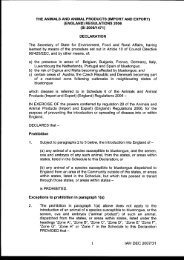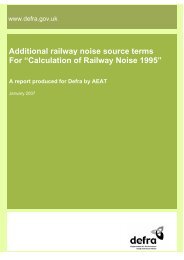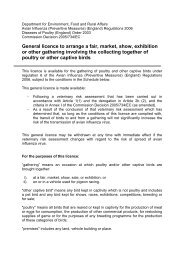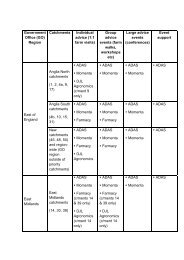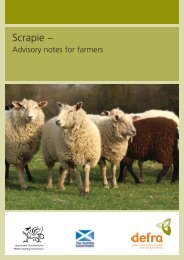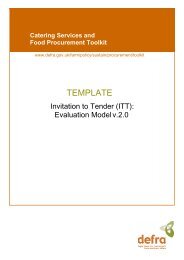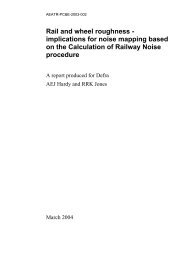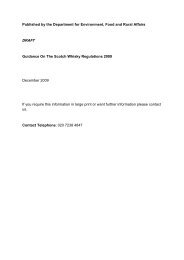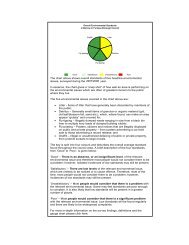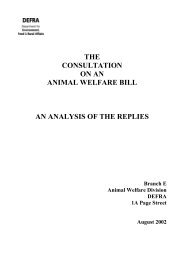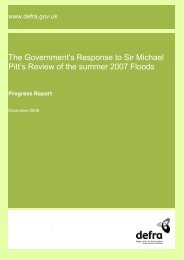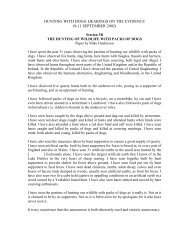Review of the Food-borne Zoonoses Research ... - ARCHIVE: Defra
Review of the Food-borne Zoonoses Research ... - ARCHIVE: Defra
Review of the Food-borne Zoonoses Research ... - ARCHIVE: Defra
You also want an ePaper? Increase the reach of your titles
YUMPU automatically turns print PDFs into web optimized ePapers that Google loves.
Project code: OZ0612<br />
Project title: The epidemiology <strong>of</strong> campylobacter infection in dogs<br />
in <strong>the</strong> context <strong>of</strong> <strong>the</strong> risk to humans<br />
Start date (dd/mm/yy): 18/07/2005<br />
End date (dd/mm/yy): 16/07/2008<br />
£228,351<br />
Total cost:<br />
Affiliation: University <strong>of</strong> Liverpool<br />
Sub-contractor(s):<br />
Abstract <strong>of</strong> research<br />
Campylobacter is <strong>the</strong> most common bacterial cause <strong>of</strong> human gastroenteritis in England<br />
and Wales. Most cases are due to Campylobacter jejuni infection, although C. coli and<br />
o<strong>the</strong>r species including C. upsaliensis may also be involved. Most cases <strong>of</strong><br />
campylobacteriosis in man are non-epidemic, and <strong>the</strong>re tends to be a higher prevalence<br />
in children. Poultry meat has always been considered to be a major source <strong>of</strong> human<br />
campylobacteriosis, but campylobacter are also found in a number <strong>of</strong> o<strong>the</strong>r species,<br />
including dogs. The prevalence <strong>of</strong> infection in dogs appears to be high (up to 56%) and<br />
<strong>the</strong>re is evidence that dogs may be a risk factor for human infection. Humans have<br />
frequent contact with dogs and dog faeces, and clearly where faecal pathogens such as<br />
campylobacter are present <strong>the</strong>re may be considerable opportunities for zoonotic<br />
transmission.<br />
This proposal addresses <strong>the</strong> risk <strong>of</strong> human campylobacter infection from dogs. Although<br />
<strong>the</strong>re is epidemiological evidence <strong>of</strong> an association between campylobacter in dogs and<br />
disease in humans, <strong>the</strong>re is little information on specific risk factors for this. Specifically,<br />
we will<br />
• determine <strong>the</strong> prevalence <strong>of</strong> campylobacter carriage in dogs in a community-based<br />
census study, in selected kennel populations and in <strong>the</strong> wider population. • identify risk<br />
factors associated with campylobacter carriage in dogs, including human, household,<br />
and management variables.<br />
• determine <strong>the</strong> population structure <strong>of</strong> <strong>the</strong> campylobacter isolates from dogs in relation<br />
to human strains. C.jejuni isolates will be examined in collaboration with Dr K Dingle,<br />
University <strong>of</strong> Oxford.<br />
The study will also provide a resource for small animal infectious disease surveillance.<br />
More specifically we will<br />
• create a microbiological and epidemiological data archive which could be used, with<br />
fur<strong>the</strong>r funding, as a surveillance resource for o<strong>the</strong>r zoonotic, or potentially zoonotic<br />
canine faecal pathogens. In this context it has been agreed with <strong>Defra</strong> that as part <strong>of</strong> this<br />
project <strong>the</strong> samples will be screened for Salmonella spp.<br />
• provide added value to <strong>the</strong> contact network studies between dogs, and dogs and<br />
humans already funded by VLA/<strong>Defra</strong> (PU/T/PSC/04(22)).<br />
• produce a template for future surveillance studies on small animal pathogens, both in<br />
kennelled populations and in <strong>the</strong> community.<br />
• provide a small animal project input into <strong>the</strong> proposed National Centre for Zoonosis<br />
<strong>Research</strong>, to be based at <strong>the</strong> University <strong>of</strong> Liverpool.<br />
85



